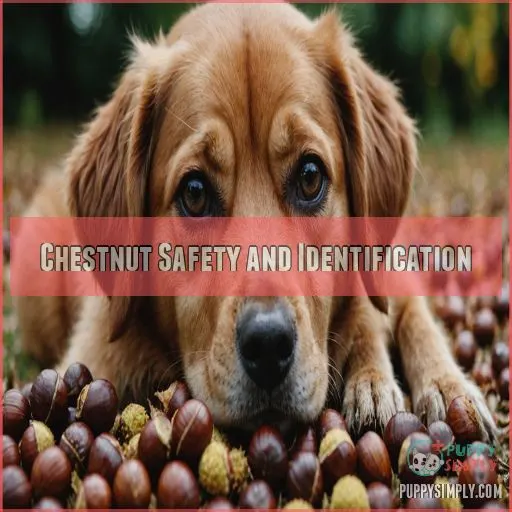This site is supported by our readers. We may earn a commission, at no cost to you, if you purchase through links.

Think of chestnuts as a seasonal doggy treat; they offer antioxidants and fiber, but moderation is key to avoid digestive drama.
Always shell and cook them first; it helps prevent choking. Just like you wouldn’t gobble up a whole pie in one sitting, don’t let your pup overindulge! For safe munching tips and the surprising twist on what chestnuts do for Rover’s health, we’ve got you covered in the full article!
Table Of Contents
- Key Takeaways
- Can Dogs Eat Chestnuts Safely
- Nutritional Benefits of Chestnuts for Dogs
- Risks of Feeding Chestnuts to Dogs
- How to Feed Chestnuts to a Dog
- Alternatives to Chestnuts for Dogs
- Chestnut Safety and Identification
- Frequently Asked Questions (FAQs)
- Can dogs eat Chinese chestnuts?
- Can you be allergic to chestnuts?
- Are chestnuts good for dogs?
- Can dogs eat horse chestnuts?
- Are chestnuts safe for dogs to eat?
- Can dogs and cats eat chestnuts?
- How to tell the difference between sweet chestnuts and horse chestnuts?
- Are horse leg chestnuts good for dogs?
- What are the symptoms of a chestnut allergy in dogs?
- How many chestnuts can a dog safely eat?
- Should chestnuts be part of a dog’s regular diet?
- How do I store chestnuts for dog consumption?
- Can chestnuts interact with other foods or medications for dogs?
- Conclusion
Key Takeaways
- Stick to American chestnuts: They’re safe for dogs, unlike horse chestnuts which are as welcoming as a porcupine’s hug. Always remove the shells and cook them first to prevent any "crunchy surprise" incidents.
- Moderation is your best friend: Think of chestnuts as a tasty seasonal treat rather than a staple. Just like you wouldn’t eat a whole cake in one go, don’t let Rover indulge too much—watch out for tummy troubles.
- Watch for allergies and choking risks: Safety first! Cut chestnuts into snack-sized bites, and if your dog starts itching or swelling, it’s time to call the vet. Remember, an ounce of prevention is worth a pound of cure.
- Chestnuts pack a nutritional punch: They’re not just for nibbling by the fire; these nuts are loaded with antioxidants, fiber, and essential minerals. But remember, balance is key—your dog’s main diet is still their regular food.
Can Dogs Eat Chestnuts Safely
Sure, your dog might be curious when they see you munching on chestnuts, but not all chestnuts are safe for them.
Let’s crack open the details on which types are safe for your furry friend and which should stay off their menu.
Types of Chestnuts That Are Safe for Dogs
Regarding feeding your canine companion, you can rest assured that American chestnuts are perfectly safe for dogs to enjoy.
These nutrient-rich nuts contain antioxidants and fiber that can benefit your pup’s health.
Just be sure to remove the outer shell and serve them in moderation as a tasty treat.
Types of Chestnuts to Avoid
Steer clear of horse chestnuts (conkers) for your pup! Beneath their smooth, rounded exterior lurks aesculin, a real party pooper causing horse chestnut toxicity.
Conker dangers can lead to an upset stomach and, more seriously, toxic reactions.
Confused between chestnuts and acorns? Keep an eye out for those telltale sparse, thick spikes.
Toxic tree nuts like horse chestnuts pose a serious choking hazard and dog allergy risk, so opt for dog food instead.
Nutritional Benefits of Chestnuts for Dogs
When you treat your dog to chestnuts, you’re offering a snack that’s tasty and packed with beneficial nutrients.
These little nuts are bursting with antioxidants, essential minerals, and helpful fiber, making them a win-win for your furry friend’s health!
Antioxidants and Free Radicals
Recognizing safe chestnuts is just step one! Let’s talk antioxidants. These warriors help protect your dog’s cells from free radical damage.
Eating a chestnut means:
- Antioxidant benefits for Fido.
- Boosts cell protection.
- Fights oxidative stress.
- Enhances dog nutrition and safety.
Fiber Content and Digestion
Chestnuts’ fiber-rich nature can work wonders for your pup’s gut health, promoting regular bowel movements and preventing pesky issues like constipation or bloating.
Just be sure to feed these tasty treats in moderation to avoid any tummy troubles.
Essential Minerals and Vitamins
When you add chestnuts to your dog’s diet, you’re giving them more than just a tasty snack!
Packed with essential minerals and vitamins like copper, manganese, and B6, these nuts can boost anything from metabolism to bone health, making for a truly healthy treat.
Risks of Feeding Chestnuts to Dogs
Feeding chestnuts to your dog isn’t without its risks, as they can be a choking hazard or cause digestive issues if consumed in excess.
Always play it safe by preparing them properly and monitoring for any allergic reactions, because nobody wants a nutty adventure ending in a rush to the vet!
Choking Hazards and Preparation
Make sure your furry friend stays safe by preparing chestnuts the right way! Remove the shells, cook them, and cut them into snack-sized bits to prevent choking. Here’s your quick and easy game plan:
- Shell removal
- Safe cutting methods
- Cook by boiling or roasting
- Size matters
Excessive Consumption and Digestive Issues
Overindulging in chestnuts can upset your pup’s tummy.
The high fiber content may lead to gas, bloating, and even diarrhea.
Moderation is key – stick to just a few pieces per week and watch for any digestive distress.
| Symptom | Cause |
|---|---|
| Abdominal Pain | Excessive Fiber |
| Constipation | High Fiber Content |
| Diarrhea | Digestive Upset |
Allergies and Sensitivities
We’ve all heard that too much of a good thing can sometimes be bad, right?
Occasionally, your dog might react to chestnuts.
Look for:
- Itching or scratching
- Swelling or hives
- Breathing difficulties
Identifying allergies can be tricky, but necessary!
How to Feed Chestnuts to a Dog
Before letting your dog enjoy some chestnuts, make sure you prepare them properly by shelling, roasting, or boiling to make sure they’re safe and tasty.
Remember, moderation is key—just like we shouldn’t eat an entire cake in one sitting, your dog shouldn’t have too many chestnuts at once!
Preparing Chestnuts for Dogs (Shelling, Roasting, Boiling)
Preparing chestnuts for your dog can be a breeze!
Shell them first—nobody likes a crunchy surprise.
Opt for roasting or boiling, skipping any salt or seasonings.
Your dog’s reaction is usually positive when you follow these chestnut safety tips.
Bon appétit to your furry friend!
Feeding Chestnuts in Moderation
Offer chestnuts as an occasional treat, not a dietary staple. Pint-sized pups may need just a few bite-sized pieces, while larger dogs can enjoy a few more.
But don’t overdo it – too many chestnuts can upset sensitive tummies.
- Limit chestnut treats to 10% of your dog’s daily calories
- Adjust portion sizes based on your dog’s size and age
- Monitor for any digestive issues like diarrhea or constipation
- Consult your vet if you have concerns about chestnut consumption
- Provide a balanced, high-quality diet as the foundation of your dog’s nutrition
Cutting and Monitoring for Choking Risks
How can you keep your dog safe while enjoying chestnuts to avoid cherry poisoning??
Cut them into bite-sized pieces to match their small mouths and prevent choking.
Supervision is key—watch for any signs of choking, like gagging or coughing.
Consider your dog’s breed and chestnut size.
| Chestnut Size | Dog Breed | Safe Cutting |
|---|---|---|
| Large | Small breed | Cut into thirds |
| Medium | Medium breed | Cut in halves |
| Small | Large breed | Cut as needed |
Alternatives to Chestnuts for Dogs
If chestnuts aren’t quite your dog’s style, there are plenty of other tasty and safe options that they might enjoy!
From crunchy carrots and sweet apples to protein-packed salmon and eggs, you’ll find plenty of delicious foods that make healthy alternatives to chestnuts.
Safe Foods for Dogs (Apples, Carrots, Green Beans)
While chestnuts are a treat, dogs might wag their tails for safer nibbles like apples (seedless), crunchy carrots, and green beans.
These snacks are healthy dog treats, avoiding human food dangers and ensuring dog food safety.
They’re simple, yet delightful, alternatives! Isn’t that the best?
Nutritious Foods for Dogs (Sweet Potatoes, Pumpkin)
Sweet potatoes and pumpkin are nutritious alternatives to chestnuts, providing fiber, vitamins, and minerals to support your pup’s overall health.
These veggies can be cooked and served as tasty, low-calorie treats your dog is sure to love!
- Supports digestion
- Boosts immune function
- Promotes healthy skin and coat
Protein-Rich Foods (Salmon, Eggs, Peanut Butter)
For dogs chasing that protein boost, salmon, eggs, and peanut butter can be excellent choices.
Salmon’s great for shiny coats, eggs are paw-sitively nutritious, and peanut butter—just make sure it’s xylitol-free—is a total treat.
Remember, treats are complements, not replacements, for balanced diets.
Chestnut Safety and Identification
When you’re out with your dog, knowing the difference between edible chestnuts and the toxic horse chestnuts could save the day.
Edible ones have a pointy top with thin spikes, while horse chestnuts are rounded and smooth—like a distant cousin who shows up uninvited and should always be avoided.
Identifying Edible Chestnuts (Pointy Top, Thin Spikes)
Thinking about tasty alternatives for your dog?
Make sure you’re picking the right chestnuts!
Look for edible chestnuts with a pointy top and thin spikes on their pods.
Unlike their toxic lookalikes, these traits help guarantee you’re providing a safe, munch-worthy treat for Fido.
Identifying Horse Chestnuts (Rounded, Smooth, Sparse Spikes)
Horse chestnuts may resemble edible chestnuts, but you can easily spot the difference.
Look for a rounded, smooth appearance with sparse, thick spikes on the pods – a clear sign it’s not a true chestnut.
Stay safe and steer clear of these lookalikes.
- Rounded, smooth appearance
- Sparse, thick spikes on pods
- Not a true chestnut
Horse Chestnut Toxicity and Risks
Spotting horse chestnuts isn’t just a walk in the park!
These conkers contain aesculin, which is harmful to dogs.
Devour one, and your pup might face vomiting, diarrhea, or worse.
Stay alert when out walking and always have first aid for unforeseen nibbles.
Frequently Asked Questions (FAQs)
Can dogs eat Chinese chestnuts?
You can safely feed your pup American chestnuts, but steer clear of the toxic horse chestnuts.
Just be sure to remove the shells and serve in moderation to avoid digestive issues.
When in doubt, consult your vet for personalized guidance.
Can you be allergic to chestnuts?
Yes, you can be allergic to chestnuts, just like peanuts can cause problems for some people.
Allergies can cause itching, swelling, or difficulty breathing.
Always consult your doctor if you’re chestnut-curious and suspect an allergy.
Are chestnuts good for dogs?
Chestnuts, when properly prepared, are safe and beneficial for dogs in moderation.
Packed with nutrients, they can be a delightful treat.
Remember, though—american chestnuts are good, horse chestnuts are toxic!
Always consult your vet first.
Can dogs eat horse chestnuts?
Steer clear of horse chestnuts for your furry friend; they’re as toxic to dogs as a porcupine’s hug would be prickly.
Opt for non-toxic American chestnuts instead, and keep Fido’s tummy happy and healthy.
Are chestnuts safe for dogs to eat?
You can feed your pup certain types of chestnuts, but steer clear of horse chestnuts – they’re toxic!
Stick to American chestnuts, and always consult your vet before introducing new foods.
Moderation is key for a happy, healthy dog.
Can dogs and cats eat chestnuts?
Imagine munching on crunchy leaves in a fall breeze—cats generally can’t eat chestnuts, and they should avoid them due to risks.
American chestnuts can be enjoyed by dogs, but horse chestnuts should be avoided.
Always consult the vet!
How to tell the difference between sweet chestnuts and horse chestnuts?
Telling sweet chestnuts from horse chestnuts is easy!
Sweet chestnuts have spiky, pointy tops with two or more seeds per pod.
Horse chestnuts sport smooth, rounded tops, sparse thick spikes, and just one seed inside.
Are horse leg chestnuts good for dogs?
A penny saved is a penny earned, but regarding horse leg chestnuts, avoid them for your dog.
They’re not the same as edible chestnuts and don’t offer any nutritional benefits to dogs.
What are the symptoms of a chestnut allergy in dogs?
If your dog has a chestnut allergy, they may experience symptoms like itching, swelling, or difficulty breathing.
Monitor your pup closely and consult your vet if you notice any adverse reactions after feeding chestnuts.
How many chestnuts can a dog safely eat?
Think of chestnuts as a treat, not a meal.
Giving your dog a couple of small pieces once a week keeps the balance.
Like a wise captain steering a ship, moderation helps their tummy stay happy.
Should chestnuts be part of a dog’s regular diet?
Chestnuts shouldn’t be part of your dog’s regular diet.
They’re a tasty treat in moderation, but too many might cause tummy troubles.
Stick with their balanced dog food and occasionally offer chestnuts for a delightful change.
How do I store chestnuts for dog consumption?
Store chestnuts in a cool, dry place to keep them fresh for your dog.
After preparing them, refrigerate in an airtight container for up to a week.
Don’t let them sit longer, or they’ll become less appetizing!
Can chestnuts interact with other foods or medications for dogs?
You’ll want to steer clear of feeding chestnuts alongside any medications your pup’s taking, as the high fiber content could interfere with absorption.
Always consult your vet before introducing new foods to your furry friend’s diet.
Conclusion
Regarding chestnuts, don’t throw caution to the wind! Dogs can eat chestnuts, but stick to those tasty American ones and steer clear of the toxic horse chestnuts.
Chestnuts can offer surprising benefits like antioxidants and fiber, but they also come with risks like choking and allergies.
To keep your pup’s tail wagging, prepare them properly and serve these treats sparingly. Remember, Rover’s health thrives on moderation and safe snacks, making your care paramount.












